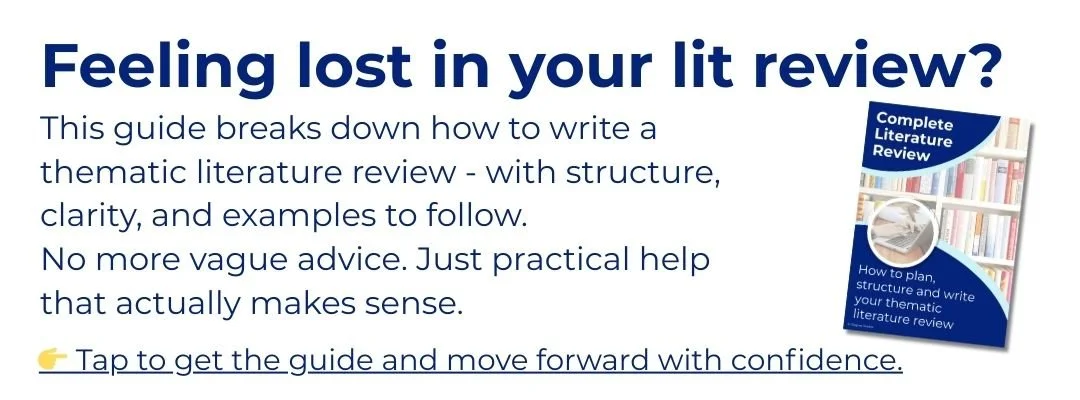Thematic literature reviews and chronological literature reviews. What’s the difference? Which one should you choose for your PhD literature review?
What's the difference between thematic and chronological literature reviews, and which one should you choose for your PhD literature review?
Today, we're diving into one of the most common dilemmas faced by graduate students: how to structure a literature review. It's a topic that sparks endless questions, but I'm here to break it down for you. So grab a cup of coffee, get cozy, and let's explore the fascinating world of literature review structures!
Chronological literature review
First up, let's talk about the chronological structure. Picture this: you're embarking on a journey through the annals of research history, tracing the evolution of ideas over time. That's what a chronological literature review is all about. You start with the oldies but goodies, the foundational studies and theories that laid the groundwork for your field. Think Maslow and his hierarchy of needs, or Freud delving into human desires. Then, you gradually make your way to the present day, exploring how these theories have morphed and adapted in response to societal changes and technological advancements.
For example, let's take a stroll down memory lane and examine the evolution of consumer behavior. We'd begin by dusting off those vintage psychological theories, then meander through the emergence of marketing studies in the 20th century, and finally, we'd arrive at the digital age, where online consumer behavior and social media influencers reign supreme. By following this chronological roadmap, researchers can map out the twists and turns in the journey of knowledge, revealing insights into how ideas have blossomed over time.
Thematic literature review
Now, onto the thematic structure – my personal favourite!
Thematic literature reviews organise content around central themes like ideas and concepts, unlike chronological reviews which follow a timeline of publication. Thematic reviews provide a holistic view by emphasising interconnected ideas rather than temporal or procedural sequences.
In other words, thematic literature reviews are like sorting your wardrobe by colours instead of by purchase date. They group similar ideas together, giving you a big-picture view, unlike chronological reviews which follow a timeline, or methodological reviews that dive into research methods. Thematic reviews help you connect the dots between different studies, making your research more cohesive and understandable.
Let's say we're exploring youth homelessness. With a thematic approach, we'd unearth themes like socioeconomic factors, mental health challenges, policy interventions, and intersectional issues. Each theme represents a thread in the rich tapestry of research, weaving together disparate studies into a unified storyline. By organising our literature review thematically, we can shine a spotlight on the interconnectedness of ideas, illuminating patterns and insights that might otherwise remain hidden.
Chronological or thematic? How to decide
Now, I know what you're thinking: "But how do I choose the right structure for my literature review?" There are a few factors to consider:
Firstly, take a peek into the norms of your discipline. Are there established conventions for structuring literature reviews? It's like knowing the unwritten rules of the game – essential for playing by the book or bending the rules just a tad, which sometimes is completely justified.
Next, think about your research topic and objectives. Is your study more about tracing the historical evolution of ideas or exploring different perspectives on a complex issue? Your structure should align with your research goals, guiding readers on a journey that reflects the essence of your study.
And finally, consider the scope and breadth of the literature. Is it a vast ocean of research spanning decades, or a smaller pond with diverse themes and perspectives? The size of your literary landscape will influence the best route to take – whether it's the scenic route of chronological exploration or the thematic expressway.
So, whether you're a fan of following timelines or prefer diving deep into thematic explorations, there's no one-size-fits-all answer. It all boils down to what suits your research needs and objectives best.
